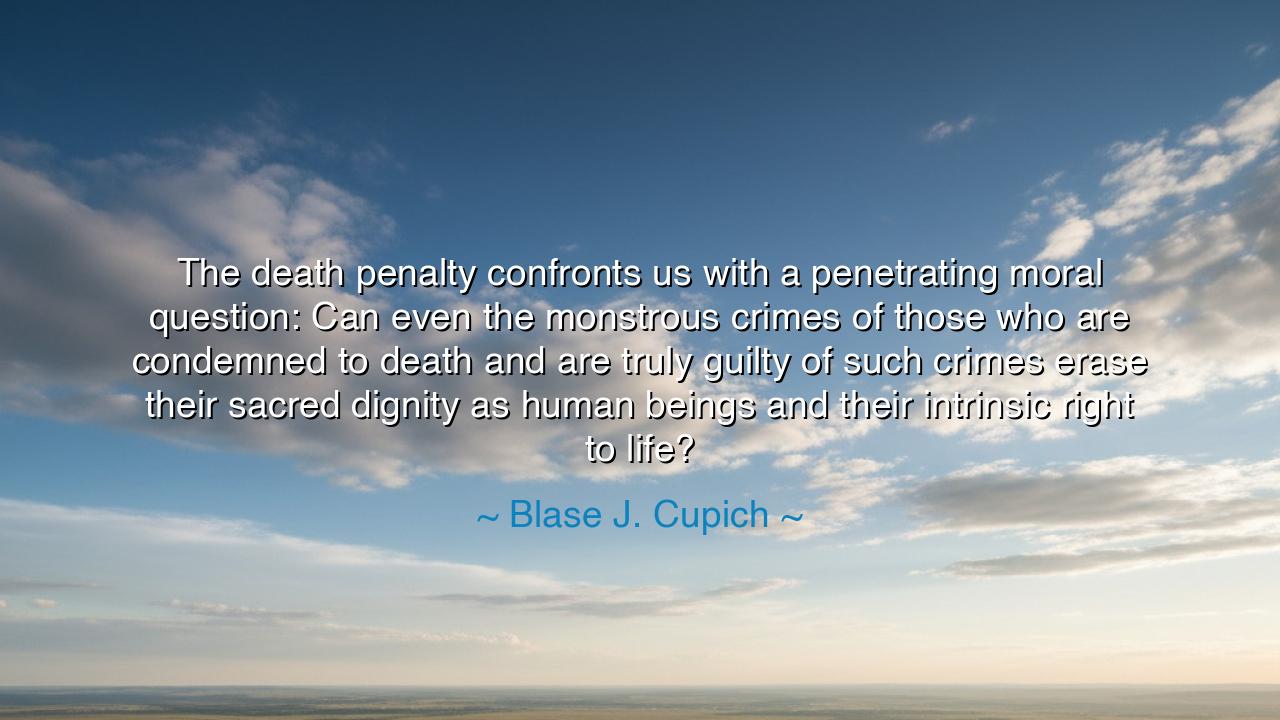
The death penalty confronts us with a penetrating moral question:
The death penalty confronts us with a penetrating moral question: Can even the monstrous crimes of those who are condemned to death and are truly guilty of such crimes erase their sacred dignity as human beings and their intrinsic right to life?






The words of Blase J. Cupich — “The death penalty confronts us with a penetrating moral question: Can even the monstrous crimes of those who are condemned to death and are truly guilty of such crimes erase their sacred dignity as human beings and their intrinsic right to life?” — rise like a challenge to the conscience of humanity. They are not spoken lightly, nor from the safety of indifference, but from the deep well of reflection that asks us to look beyond vengeance, beyond even justice as the world defines it, into the very mystery of what it means to be human. In this single question lies the struggle of the ages: whether man’s dignity is something that can be lost through evil, or whether it is something eternal — unbreakable, even in sin.
Cardinal Blase J. Cupich, a voice of moral clarity in the modern Catholic Church, spoke these words not as a mere opinion, but as a call to spiritual reckoning. His question emerges from the Church’s long and painful reflection on the nature of life, mercy, and punishment. For centuries, the world has justified the death penalty as retribution — the repayment of blood for blood. Yet Cupich, echoing the teachings of Christ and the more recent proclamations of the Church under Pope Francis, calls us to a higher truth: that even those who have committed unspeakable evil remain, somehow, children of God. Their actions may have destroyed others’ lives, but their human dignity — the sacred image of the divine within them — cannot be annihilated by their own wickedness.
To understand this truth, one must first look deeply into what dignity means. It is not a reward for virtue, nor a privilege earned by good behavior. Dignity is intrinsic, woven into the essence of every soul. It is the flame placed there by the Creator, the breath of the divine that animates all living beings. When we say that even the guilty possess this dignity, we are affirming that the worst of men cannot destroy the image of God within themselves — they can only obscure it. Thus, when society extinguishes their life through the death penalty, it does not merely punish the guilty; it participates in the denial of the divine spark that gives meaning to justice itself.
History offers many lessons to illuminate this truth. Consider the case of Saint John Paul II, who, after surviving an assassination attempt in 1981, visited the man who had tried to kill him — Mehmet Ali Ağca — in prison. There, face to face with the one who had nearly ended his life, the pope chose forgiveness over condemnation. He spoke not of vengeance, but of redemption, and in that act he revealed the heart of Cupich’s question. If even a man who sought to destroy innocence can still be met with mercy, then surely his dignity still endures. For forgiveness is not given to the innocent, but to the guilty — and through it, both the victim and the sinner are transformed.
Cupich’s question also exposes the flaw in human justice when it is rooted in retribution rather than restoration. The death penalty seeks to end evil by killing the evildoer, but in doing so it mirrors the very violence it condemns. It teaches that some lives are beyond redemption, some souls beyond compassion — yet this belief corrodes the moral foundation of a just society. If we declare that dignity can be erased by sin, then we deny our own claim to mercy, for who among us has not fallen short of the good? The ancient scriptures remind us: “Vengeance is mine, says the Lord.” To take life in the name of justice is to assume the authority of God, yet without His infinite understanding or mercy.
And so, my children, the death penalty becomes not a test of the condemned, but a test of the living — a test of whether we truly believe in the sanctity of life. It forces us to confront our own capacity for compassion, our own faith in the possibility of redemption. It is easy to proclaim love for the innocent; it is far harder to uphold the dignity of those who have done evil. Yet it is precisely there, in that difficulty, that the moral strength of a people is revealed. To affirm that even the guilty possess an intrinsic right to life is not to excuse their crimes, but to proclaim that mercy is stronger than hatred, and that justice, to be pure, must be tempered with love.
Let this truth be your lesson: do not allow vengeance to disguise itself as justice. The dignity of life must be upheld even in the face of horror, for once we declare that some lives are unworthy, all lives become less sacred. Remember that punishment should never be destruction, but correction; not the end of the sinner, but the beginning of his reckoning with grace. Work, therefore, for a world where justice restores rather than kills, where mercy reigns above wrath. For as Blase J. Cupich reminds us, the question is not whether the condemned deserve to die — but whether we, in killing them, deserve to call ourselves just.






AAdministratorAdministrator
Welcome, honored guests. Please leave a comment, we will respond soon